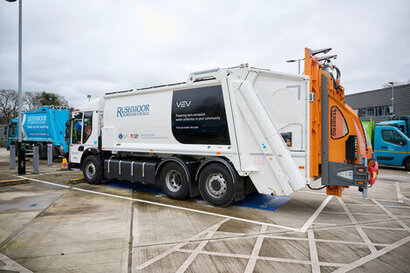
Refuse collection vehicles (RCVs) are classified as heavy goods vehicles (HGVs) and can emit up to 600g CO2 per kilometre when fully laden. They are arguably among the largest carbon emitters in councils’, or their contractors’, vehicle fleets – making them priority candidates for electrification and a key focus for change to be successful in meeting carbon reduction targets by 2030.
Supporting the climate emergency targets of Basingstoke and Deane, and Hart and Rushmoor Councils, Serco, RVS and VEV have combined their expertise to reduce the carbon footprint of recycling and refuse collection by demonstrating the capabilities of electrically powered collection vehicles (eRCVs).
Set to be deployed in a pilot scheme, RVS has refurbished and repowered two diesel RCVs into as-new electric vehicles. This process results in a lower manufacturing carbon footprint compared to building a new EV from scratch, while also removing a diesel vehicle from the fleet.
Leveraging its expertise in fleet electrification, VEV has supplied and installed charging infrastructure for the eRCVs, and deployed its bespoke fleet management platform, VEV-IQ, to track performance during the pilot.
VEV-IQ will monitor multiple parameters throughout the pilot programme, including the eRCVs’ operational routes, charging schedules, power usage, and CO2 savings for the councils and Serco.
The project builds on the initial electrification feasibility assessment conducted by VEV at Rushmoor. The pilot will demonstrate the significant emissions- and noise-reducing benefits of electric vehicle waste collection, along with the operational benefits of eRCVs, and establish the business case for Serco to electrify their refuse collection fleets.
“Electrifying recycling and refuse collection gives local councils the opportunity to significantly reduce carbon emissions and noise pollution simultaneously, compared to a conventionally powered vehicle” said VEV CEO Mike Nakrani. “We are pleased to work with RVS and Serco to deliver on the climate emergency targets of Basingstoke and Deane, and Hart and Rushmoor Councils. We’re confident in proving the operational and business case for fleet electrification to reduce the carbon footprint of local council fleets, while delivering a cleaner, quieter environment for local residents.”
For additional information:

